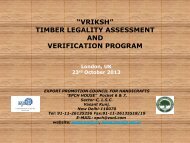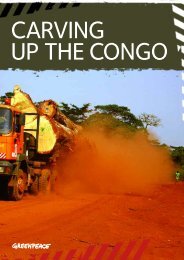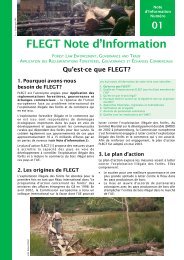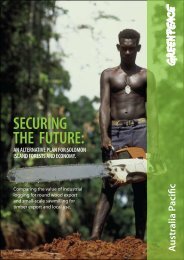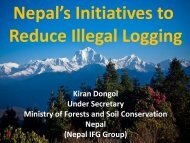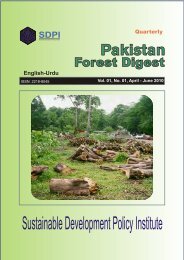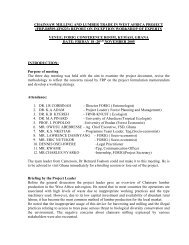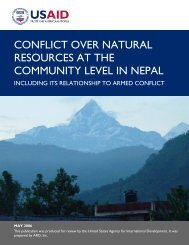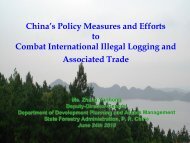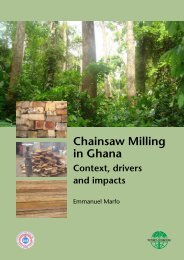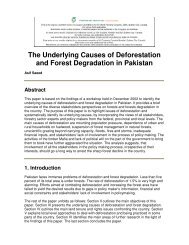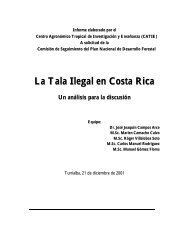download document - Rights and Resources Initiative
download document - Rights and Resources Initiative
download document - Rights and Resources Initiative
- No tags were found...
You also want an ePaper? Increase the reach of your titles
YUMPU automatically turns print PDFs into web optimized ePapers that Google loves.
Historical <strong>and</strong> contemporary l<strong>and</strong> laws <strong>and</strong> their impact on indigenous peoples’ l<strong>and</strong> rights in Ug<strong>and</strong>a:The case of the BatwaFrom the onset of British rule, all communities could remain in possession of the l<strong>and</strong> theyoccupied only if they proved ‘cultivation <strong>and</strong> regular use’. The phrase ‘regular use’ is unlikley toinclude hunting <strong>and</strong> gathering, since cultivators had to be settled in one place for their l<strong>and</strong> tobe recognised as ‘cultivated <strong>and</strong>/or regularly used’ <strong>and</strong> therefore possibly owned.3.1.2 The 1900 Bug<strong>and</strong>a Agreement: the new regime of l<strong>and</strong> rightsThrough the 1900 Bug<strong>and</strong>a Agreement, the British aimed to entrench the agricultural economyby alienating l<strong>and</strong> <strong>and</strong> creating individual ownership tenure. 59 This system replaced customaryl<strong>and</strong> tenure <strong>and</strong> created security of tenure for individuals rather than communities, posing athreat to communal l<strong>and</strong> rights holders. It had the effect of redistributing l<strong>and</strong> <strong>and</strong>extinguishing existing rights to l<strong>and</strong> of a number of communities in Ug<strong>and</strong>a. Forests werevested in Britain’s Ug<strong>and</strong>a Administration, 60 <strong>and</strong> the agreement reiterated <strong>and</strong> entrenched theearlier concepts of ‘waste <strong>and</strong> uncultivated l<strong>and</strong>s’ which was also vested in the Ug<strong>and</strong>aAdministration. The rest of the l<strong>and</strong> in Ug<strong>and</strong>a was declared Crown l<strong>and</strong>. All personsoccupying such l<strong>and</strong>s were now customary tenants of Her Majesty’s Government representedby the Ug<strong>and</strong>a Administration. A l<strong>and</strong>holding system akin to the British system of tenures <strong>and</strong>estates was ushered into the legal regime in Ug<strong>and</strong>a. 61 However, their Lordships in the Nigeriancase of Amodu Tijan vs The Secretary, Southern Nigeria admit that in most parts of the BritishEmpire, native title is conceptually unique <strong>and</strong> does not necessarily fit within the Englishconcepts of ‘tenure’ <strong>and</strong> ‘estates’. 62In other jurisdictions colonised by the British, such as Papua New Guinea, recognition ofcustomary l<strong>and</strong> rights was the general rule rather than the exception. 63 In East Africancountries, the reverse was true. 64 The allocation of l<strong>and</strong> under the 1900 Bug<strong>and</strong>a agreement isseen as vesting forest l<strong>and</strong> under the control of the Ug<strong>and</strong>a administration. However, BritishColonial Constitutional Law held, in effect, that rights to l<strong>and</strong>s in ceded territories were notaffected by a change in sovereignty <strong>and</strong> persisted until such time as the legislator acted to bringabout a change in the system. Arguably, this provision in the 1900 Bug<strong>and</strong>a Agreement did notaffect the status quo of the Batwa’s claim to their l<strong>and</strong> since they were not part of Ug<strong>and</strong>a until1912. The case cited above of Amodu Tijan vs The Secretary, Southern Nigeria 65 offers apersuasive precedent. In this case, the Government of the Colony acquired certain l<strong>and</strong>s forpublic purposes. The Privy Council upheld the appellant’s claim to compensation on the basisthat he had a mere right of control <strong>and</strong> management of the l<strong>and</strong> rather than ownership. Thisdecision could be celebrated as st<strong>and</strong>ard-setting on the claims to compensation for loss of l<strong>and</strong>rights to new governments of British colonies. Today, if this rule was replicated in Ug<strong>and</strong>a forthe benefit of the Batwa, the chances are high that it would deliver them justice.59 Morris <strong>and</strong> Read (1966), p 20.60 Article 21 of the agreement provided that throughout the agreement the phrase ‘Ug<strong>and</strong>a Administration’shall be taken to mean the general government of the Ug<strong>and</strong>a Protectorate.61 See Milsom (1976), p 39.62 UK Government, 2 Appeal Cases 399, Privy Council decision of 11 July 1921.63 Mugambwa (2007), p 40. Note that successive governments maintained the status quo ante. To date, 97% ofl<strong>and</strong> in Papua New Guinea is held under customary tenure.64 Ibid.65 UK Government, 2 Appeal Cases 399, Privy Council decision of 11 July 1921.Nakayi 12January 2009



